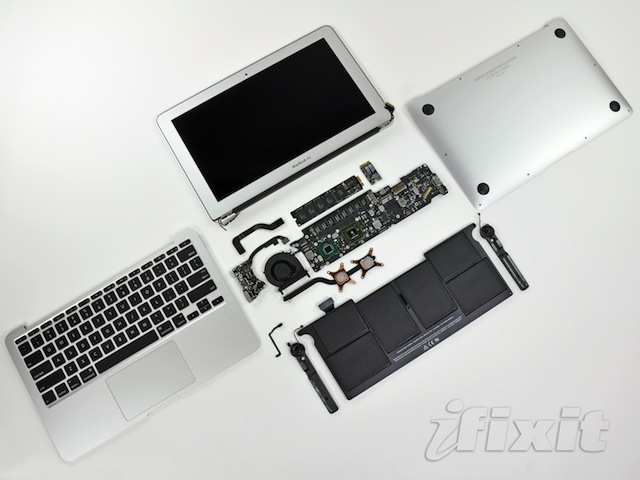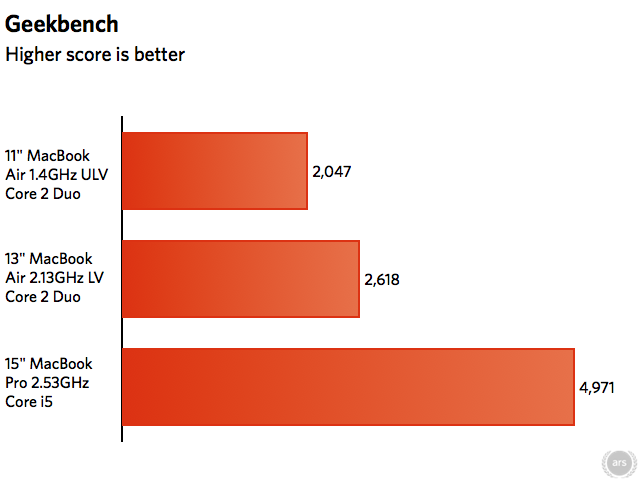We did find (quite by accident) that Apple may have more reasons behind not installing Flash by default other than the stated reason of ensuring that users always have the most up-to-date version. Having Flash installed can cut battery runtime considerably—as much as 33 percent in our testing. With a handful of websites loaded in Safari, Flash-based ads kept the CPU running far more than seemed necessary, and the best time I recorded with Flash installed was just 4 hours. After deleting Flash, however, the MacBook Air ran for 6:02—with the exact same set of websites reloaded in Safari, and with static ads replacing the CPU-sucking Flash versions.
Apple was able to achieve 5+ hours of runtime on just 4500mAh (previous MacBook Air models had roughly 5100mAh batteries, yet were only rated for the same 5 hours) in a few ways. The Air's logic board is tiny, minimized as much as possible to make room for the six Li-ion cells stowed underneath the keyboard and trackpad. The combination of a ULV Core 2 Duo processor with a TDP of 10 watts and an efficient NVIDIA 320M also sips juice from the battery at a slower rate than previous generation MacBook Airs.

Your use may differ from our own, but if you stick to mainly light Web surfing, e-mail, and word processing, you can get nearly a full workday from a fully charged 11" MacBook Air. If you play lots of video, games, or run CPU-intensive tasks like video encoding, expect to have to find a power outlet well within four hours.
For those trying to decide if an 11" model will cut it for mobile needs, we feel like battery life will likely be the deciding factor. If you're hoping for something that can run a full day without charging, the 13" model will likely be the better choice. The larger size is mostly taken up by a larger capacity battery, which Apple says is good for two hours more runtime. We haven't yet had a chance to evaluate a 13" MacBook Air (you can be sure we'll post the results if we do), but in our experience with the 11" version we feel confident that it should offer most Mac users a full day of use in the most minimal package.
(For comparison, the 13" MacBook Air uses four larger Li-ion cells totaling 6500mAh, though it also has a higher resolution, larger screen, and its CPU is rated at 17W TDP.)
In addition to raw runtime, though, the new MacBook Airs boast an added benefit of "up to 30 days of standby time." "Standby" is more or less equivalent to sleep, but because of the MacBook Air's architecture it works more like hitting the standby button on an iPad.
We obviously couldn't test Apple's claim in just over a week, but we did make an attempt to characterize the power drain while in standby. We charged the battery up to full, closed the lid, disconnected the power, and left it sitting for 14 hours overnight. That ran down the battery 108mAh, a little more than two percent of the max 4640mAh capacity reported by System Profiler. By our calculations, and assuming the power drain is linear, that is equivalent to about 25 days of standby time—certainly within reach of Apple's stated 30 days.
Finally, we have to note that we experienced two kernel panics during our battery testing. In both cases, it appears as if the kernel panic was triggered by putting the machine into standby mode when the battery was close to running out. Both times the machine appeared unresponsive after opening, and the display wouldn't come on. Pressing the power button to boot the machine didn't work; instead, we had to hold down the power button to power the machine off first, and then power it back on (this is a case where some sort of independent battery indicator would have helped figure out what was happening).
We discussed the issue with Apple, and provided them with crash logs, though at press time the company was unable to determine the exact cause of the problem. To our knowledge, no other reviewers have noted similar issues, and Apple said that our report was the first to detail such a problem. However, Cult of Mac noted over the weekend that at least one staffer has experienced kernel panics with a new MacBook Air. Some users have also been reporting issues with video, though we did not encounter this in our testing.
Performance
Ultraportable notebooks aren't about raw performance, and the MacBook Air—especially the 11" version—is no exception. That said, the infamous return rate on early netbooks showed that users don't like to be unpleasantly surprised by sluggishness, even in a very cheap portable, so this will be doubly true in for users who spring for a $1,000 laptop.
With the new MacBook Air, Apple made important tradeoffs designed to minimize size and weight and maximize runtime, and one of these tradeoffs was to stick with low-clock speed, ultra low-voltage Core 2 Duo processors. From a raw CPU performance standpoint, the 1.4GHz U9400 in our review unit is no match for the Arrandale-based Core i-series processors used in some ultraportables or Apple's current 15" and 17" MacBook Pros. In fact, it's not even really a match for the 2.13GHz Core 2 Duo processors in the previous-generation MacBook Air.
Apple did manage to mitigate the CPU downgrade a bit by boosting the speed of the GPU and the SSD—these changes definitely helped, but is it enough? Let's find out.
We used three different benchmarks to look at the raw performance of the 11" MacBook Air. Geekbench strictly examines CPU and memory performance. Xbench, while targeting a range of hardware all the way back to PPC-based Macs, covers a lot more ground, looking at disk performance, graphics performance, and other OS operations. And Cinebench looks at both raw CPU rendering as well as GPU-based OpenGL rendering. For comparison purposes, we also included a previous-generation 13" 2.13GHz MacBook Air and a recent vintage 2.53GHz Core i5-base 15" MacBook Pro.

Looking at the Geekbench scores, the 11" MacBook Air clearly isn't winning any speed contests. The 1.4GHz ULV CPU is further limited by an 800MHz front-side bus, so memory access is also slower compared to the 13" MacBook Air's 1066MHz FSB. With a faster bus and a 50 percent faster CPU, the previous-gen Air manages a 28 percent better score. It's not even a fair fight with the Core i5 MacBook Pro, though—with the capability of running four threads simultaneously and direct connection between CPU and RAM, it easily stomps the 11" MacBook Air.
reader comments
255